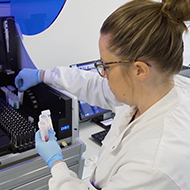
The free-access issue celebrates the impact omics has had on equine veterinary medicine.
Equine Veterinary Journal (EVJ) has published a free-access virtual issue on the influence of omics on equine veterinary medicine.
Omics refers to a field of biological sciences ending in -omics, such as genomics (study of DNA), transcriptomics (RNA), proteomics (proteins) and metabolomics (metabolites).
Co-ordinated by EVJ's associate editors Mandy Peffers and Pablo Murcia, alongside guest editors Carrie Finno, James Anderson and Macarena Sanz, the virtual issue celebrates the significant impact of omics sciences on equine veterinary medicine.
James Anderson, who has prefaced five papers on advances in equine medicine within proteomics, metabolomics and lipidomics, said: “Omics technologies have enhanced our knowledge of the molecular world and provided fascinating insight into the composition and functions of these components across a range of different animal species.
“Particularly for equine science and medicine they have increased our understanding of molecular changes in disease and informed the development of diagnostic tests.
“Although still in its infancy within equine veterinary science, this field looks likely to have a significant impact in the coming years.”
Keen to emphasise the importance to promoting open science to advance this field of research, the editors have included an editorial on open research in the collection, entitled, 'Open Research – What is it, and how can Equine Veterinary Journal's authors engage with Open Research initiatives.' This has been written by Mandy Peffers and Leah Webster.
Carrie Fino, who has contributed an editorial to support the articles demonstrating how genomic and transcriptomic approaches have been used to investigate equine diseases, commented: “While equine genomics and transcriptomics continue to evolve, improvements in the annotation of the equine genome will undoubtedly accelerate the rate of discovery.
“With the need for large sample sizes of well-phenotyped horses to study the most complex diseases, equine genomics and transcriptomics research will likely become increasingly collaborative, similar to the current status of human genomics initiatives.
“Aligned with this collaborative effort is the strong need for publicly available genomic and transcriptomic data that are accessible to all researchers.”
Mandy Peffers, associate editor of the EVJ, added: “It is exciting to see how the equine veterinary sector is now keeping pace with human medicine in the omics revolution. As we continue to advance, there will be more tools at our disposal for the diagnosis and treatment of equine disease.”
Image (C) Rossdales Laboratories



 The Animal and Plant Health Agency (APHA) has updated its online reporting service for dead wild birds.
The Animal and Plant Health Agency (APHA) has updated its online reporting service for dead wild birds.